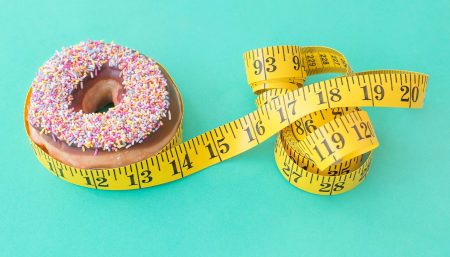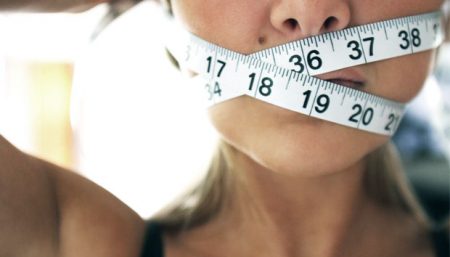
Women constantly complain that they are not losing weight in-spite of following a regular diet and exercise routine. WF team has put together top ten possible reasons why you are not losing weight. Check them out:
![]() You might not be exercising enough
You might not be exercising enough
In addition to your cardio workouts, you need to lift weights for all your muscle groups at least 2 non-consecutive days a week. And, by lifting weights, that means using enough weight that you can complete the desired number of reps. For example, if you’re doing 12 bicep curls, you need to use enough weight that you can only do 12 bicep curls and not one more. Most people don’t lift enough weight to really challenge their muscles.
![]() You’re not getting enough sleep
You’re not getting enough sleep
Lack of sleep can contribute to weight gain, though experts aren’t exactly sure why. Women who sleep 5 hours a night were more likely to gain weight than women who slept 7 hours a night
The reasons? Some studies have shown that losing sleep could affect metabolism by making you feel hungry, even if you’re not. Sleep deprivation may affect the secretion of cortisol, one of the hormones that regulates appetite. There’s also a theory that we move around less when we don’t get enough sleep, which means we burn less calories.
Getting enough sleep is crucial if you’re trying to lose weight, not just because of how it affects you physically, but mentally as well. Sleep deprivation makes you cranky, confused and can even make you feel depressed or angry. Make sleep a priority by trying to get to bed at the same time each night, shooting for about 8 hours, if you can manage it.

![]() You’re too stressed out
You’re too stressed out
![]() You’re eating too much
You’re eating too much
Women tend to lose 1% muscle mass every year after 25-30 yrs of if not training. Leading to a drop in BMR, if muscle is not preserved . Some estimates show that muscle mass declines about 4% each decade from age 25 to 50. If you’re still eating the same number of calories as your metabolism drops, your weight may creep up over time. Start exercising and lifting weights NOW to keep your metabolism in check.
![]() You’re not consistent with your exercise and healthy eating
You’re not consistent with your exercise and healthy eating
Sticking with exercise starts with finding a program you enjoy and that fits in with your lifestyle, goals and needs. That means being realistic about what you’ll really accomplish each week rather than going by what you think you should be doing.

![]() You blow it on the weekends
You blow it on the weekends
- Avoid a free-for-all weekend. Instead, choose one or two treats to enjoy and continue eating healthy the rest of the time.
- Avoid rewarding yourself with food. If you’ve been eating healthy all week, it’s natural to want to reward yourself with a yummy treat. That kind of thinking can set you back (much like a smoker who rewards himself for staying smoke-free with a cigarette). Instead of food, reward yourself with a calorie-free treat–a trip to the movies, a massage or a new pair of shoes.
- Keep moving. If you like to rest on the weekends, why not make your rests more active? Spend time taking a long walk with your family or tossing a football in the backyard.
![]() You haven’t given yourself enough time to see results
You haven’t given yourself enough time to see results
Give your body time to respond to what you’re doing. It may be weeks or months before you see significant changes so don’t freak out if you’re not seeing results after only a few weeks. Being patient and taking it one day at a time will allow you to enjoy the journey instead of focusing on the destination.
![]() You have a medical condition
You have a medical condition
There are any number of drugs that may have weight gain as a side effect for some people. Some common ones include hormonalmedications for birth control or menopause, oral steroids, some anti-depressants, diabetes medications and anti-psychotic medications.
You should get a diagnosis from a professional in order to determine whether your weight problems are medically-related.

![]() You’ve hit a plateau
You’ve hit a plateau
- Doing the same workouts over and over. Your body needs to be challenged to progress, so make sure you’re changing some part of your program every 4-6 weeks.
- Not eating enough calories. If your body doesn’t have enough fuel to sustain your level of activity, you can actually stop losing weight.
- Overtraining. If you exercise too much, the body sometimes responds by decreasing the amount of calories you burn during the rest of your day.
Learn more about whether you’ve hit a plateau by keeping an exercise calendar and tracking your workouts, how often you change them and whether you’re working too hard or need to boost your intensity.
![]() You don’t need to lose weight
You don’t need to lose weight
Take away all the reasons you want to lose weight that have anything to do with how you look. Now, look at what’s left…are there any other reasons that you need to lose weight? Are you at risk for medical conditions such as diabetes or heart disease? Is your BMI in an unhealthy range? Are you within your ideal weight range? If you’re at risk, losing weight may be important for staying healthy. But, if you’re very close to your goal and can’t seem to get rid of those last few pounds, ask yourself if you really need to lose them.
Disclaimer
The Content is not intended to be a substitute for professional medical advice, diagnosis, or treatment. Always seek the advice of your physician or other qualified health provider with any questions you may have regarding a medical condition.



